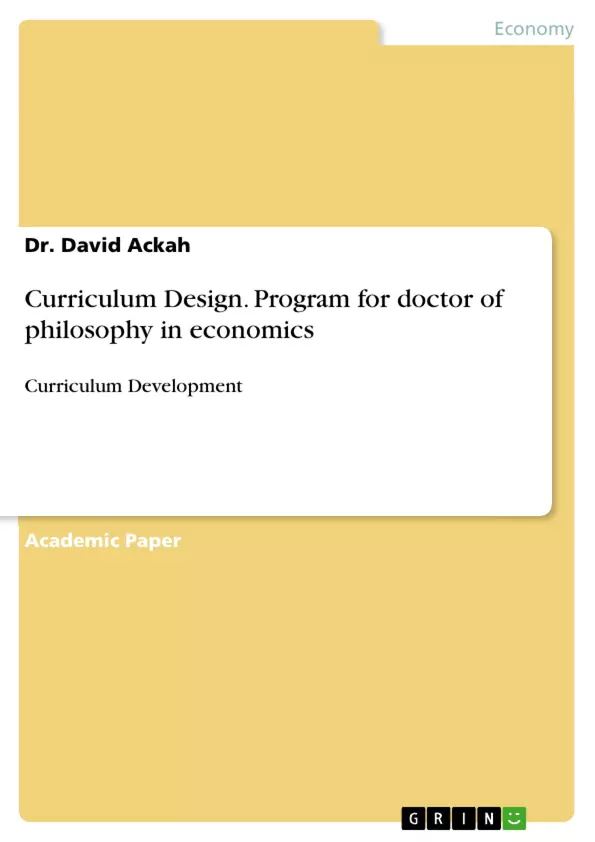Development of Curriculum for Doctor of Philosophy in Economics
This course will enable the student to understand and implement basic ideas in diverse information on economic development and Growth. The student will learn how to implement the use of growth in the office, harden various operating systems, and implement access control lists.
This will allow me to explore in everywhere I find myself in organisation.
The economics measure to put in place to bring development to every country.
Inhaltsverzeichnis (Table of Contents)
- Course Objectives
- Course Descriptions
- Activities to Carried Out
- Source of Data
- Bibliography
Zielsetzung und Themenschwerpunkte (Objectives and Key Themes)
This course aims to equip students with a comprehensive understanding of economic development and growth, focusing on the practical application of these concepts in diverse contexts. Students will learn about key macroeconomic principles and their application to current policy challenges, including market failures, government intervention, and the provision of public goods.
- Economic Growth and Development
- Macroeconomic Principles and Policy Challenges
- Market Failures and Government Intervention
- Public Goods and their Provision
- Economic Institutions and their Role in Development
Zusammenfassung der Kapitel (Chapter Summaries)
- Course Objectives: This section outlines the primary goals of the course, emphasizing the student's ability to understand and implement fundamental economic development and growth concepts.
- Course Descriptions: This section introduces the core concepts covered in the course, such as growth and development, data analysis, and statistical methods. It also highlights the importance of understanding economic institutions and their influence on development.
- Activities to Carried Out: This section describes the various activities that students will undertake to achieve the learning objectives. These activities include long-term projects, short writing assignments, and critical thinking exercises.
- Source of Data: This section lists the primary sources for the course, including academic institutions and publications.
- Bibliography: This section provides a list of references used in the course, highlighting works by prominent economists and research institutions.
Schlüsselwörter (Keywords)
Key terms and concepts explored in this course include economic growth, economic development, macroeconomic principles, market failures, government intervention, public goods, economic institutions, data analysis, statistical methods, and microeconomic models. These terms reflect the course's focus on providing students with a comprehensive understanding of the complexities of economic development and growth, both in theory and practice.
Frequently Asked Questions
What are the primary objectives of the PhD in Economics curriculum?
The course aims to help students understand and implement fundamental concepts of economic growth and development, preparing them for practical application in organizational and policy contexts.
What key macroeconomic principles are covered?
The curriculum focuses on market failures, government intervention, the provision of public goods, and the role of economic institutions in national development.
What practical skills will students acquire?
Students will learn data analysis, statistical methods, how to harden operating systems, and how to implement access control lists within an economic framework.
What types of activities are included in the course?
Activities include long-term projects, short writing assignments, and critical thinking exercises designed to apply theory to real-world policy challenges.
Why is the study of economic institutions important in this program?
The course emphasizes that institutions play a crucial role in determining the success of development strategies and economic growth across different countries.
Which sources of data are used in the curriculum?
The course utilizes data from academic institutions, prominent economists' publications, and established research organizations listed in the bibliography.
- Citation du texte
- Ph.D/M.Phil/MSc/BSc/Dip Dr. David Ackah (Auteur), 2014, Curriculum Design. Program for doctor of philosophy in economics, Munich, GRIN Verlag, https://www.grin.com/document/284131



